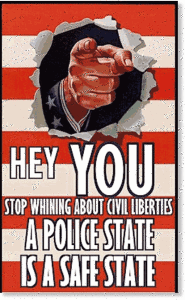 Our state officials seem to be working as hard as they can to help the NSA track the movement of US citizens as much as possible. Their latest stunt? Enhanced drivers’ licenses.
Our state officials seem to be working as hard as they can to help the NSA track the movement of US citizens as much as possible. Their latest stunt? Enhanced drivers’ licenses.
These are drivers licenses or ID cards that have a radio chip that transmit information about you. The purported reason for this is to make it easier to cross borders. Getting a passport, however, is no more hassle than getting one of these and provides you with much more privacy: as you don’t usually carry them around.
Once you have these types of ID, anyone who has the right equipment (which is cheap and easy to find) can read it. With the right antenna, you can read enhanced license plates from as far as a mile. Readers can be automatically placed throughout towns and roads, and the information about the movement of citizens can be automatically stored to help track them.
While the IDs start by being “voluntary”, they soon won’t be. You can’t get a passport without one any more, for example. They definitely make the work of police easier. You won’t need a drone to take pictures of a protest, if you can just scan the driver licenses people keep in their wallets. Why bother sending a mole into a political meeting, when you can stay outside and scan them instead?
And what a great way to give people tickets! Just keep your scanners open and you’ll be able to find out who has unpaid parking tickets or who is late with their child support and pick them up. Much easier than investigating actual crime.
It’s thus not surprising that my own Assembly member Rob Bonta, who took a ton of money form police unions for his campaign (and has taken a ton more since), already voted in favor of this bill in Committee. Shamefully, so did Loni Hancock and Ellen Corbett on the Senate, despite opposition from the ACLU, the Consumer Federation of California and Privacy Rights Clearinghouse.
Consumer groups are concerned about these chips, because they provide an open invitation to criminals. As I mentioned, the equipment to read these chips is cheap and easy to put together. While the chips are only supposed to have a number in them, not the owner’s name and address, it’s a number that is unique to its owner. Criminals can easily match numbers with their owners by either breaking into government databases or by simply scanning the licenses of people they have already identified.
The bill still has to pass the Assembly and be signed by the governor. Bonta and Bob Wieckowski, who also voted for it in Committee, still have a chance to redeem themselves and vote against it. I hope that Bill Quirk and Nancy Skinner will as well.
Here is some more info on these tags:http://cafe.1933key.com/How-RFID-Tags-Could-Be-Used-to-Track-Unsuspecting-People

